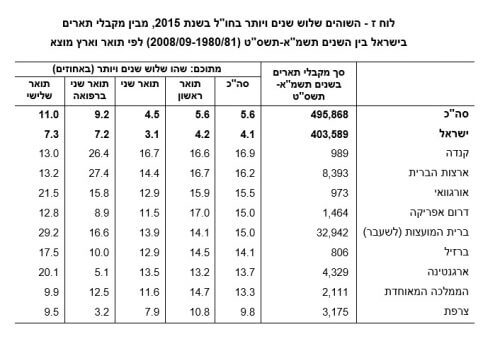This is according to a report of the Central Bureau of Statistics published yesterday. The highest share of those staying abroad for three years or more among those with a PhD was in mathematics (25%) and computer science (18.3%)

At the Central Bureau of Statistics, the phenomenon of the extended stay abroad of degree holders who received their degree from higher education institutions in Israel between the school years 2008-09 (1980/81-2015/XNUMX) was examined. The test was done as of XNUMX, and the data was entered into a database of Israelis living abroad. A stay of three years abroad does not indicate intentions to stay abroad.
According to the report titled "Holders of academic degrees from Israel who stayed abroad for three years or more in 2015" 27,826 (5.6%) of the recipients of degrees from higher education institutions in Israel between the years 1980-2009 stayed abroad for three years and more as of 2015.
The percentage of those staying abroad for three years or more is particularly high among those with a third degree (11%). The percentage of PhD holders in the exact sciences and engineering is approximately 3.4 times higher than in the humanities and social sciences (14.6% compared to 4.3%, respectively). There is also a gap in bachelor's and master's degrees. The highest share of those staying abroad for three years or more among those with a PhD was in mathematics (25%) and computer science (18.3%). The highest share of those staying abroad for three years or more among those with a master's degree was in music (21.6%), mathematics (15.1%) and computer science (14.8%).
As mentioned, the percentage of those who stay abroad for three years or more is higher with a third degree compared to the other degrees. Also, as more time passes since receiving the degree, the percentage of those staying abroad increases. The percentage staying abroad is relatively low among degree holders who received their degree in the relatively recent years 2005-2009. Exceptions are PhD degree recipients in exact sciences and engineering, 13.4% of whom stayed abroad for three years or more in the years 9.6-1983 and 84% of whom stayed abroad for three years or more, some of them for post-doctoral purposes. In fact, the percentage staying abroad among degree recipients who received their degrees in the years 1980/81-30/2008 (09/8.8-2.4/XNUMX) was higher than the percentage among degree recipients approximately XNUMX years later - in the years XNUMX-XNUMX XNUMX (XNUMX/XNUMX) (XNUMX% and XNUMX%, respectively).

The percentage of those staying abroad for three years or more, who received their bachelor's degree from universities, was significantly higher than that of bachelor's degree recipients from academic colleges, academic colleges of education, and the Open University, and reached 7.3%.
The highest percentage of those staying three years or more abroad is found among graduates of the Weizmann Institute of Science (20.4%) and the lowest among graduates of Bar-Ilan University (3.2%). But even at Bar-Ilan University, the percentage of those who stay three years or more among those with degrees in the fields of exact sciences and engineering is higher than those who studied in the fields of social sciences and the humanities - approximately 3 times for a Ph.D., 3.5 times for a Master's degree and 2 times for a Bachelor's degree.
The proportion of men staying abroad for three years is higher than the proportion of women (6.6% compared to 4.8%, respectively). The proportion of Jews who stayed abroad for three years or more was higher than the proportion of Arabs (5.6% versus 2.2%, respectively), except for those with a third degree (10.4% versus 11.9%, respectively).
The percentage of those staying abroad for three years or more was relatively high among immigrants, and especially among immigrants in the former Soviet Union, Uruguayan immigrants, and Argentine immigrants who received a third degree in Israel (29.2%, 21.5%, and 20.1%, respectively), and among immigrants from the United States and Canada who received a master's degree in medicine in Israel (27.4% and 26.4% respectively).
The report also shows that the balance between the new entrants abroad (from 2010 onwards) and the returnees is negative but stable. In 2015, 678 degree recipients returned to Israel after a prolonged stay of three years, this is a decrease after a record of 862 in 2014. However, the number of people staying abroad for an extended stay increases every year, since the number of new departures abroad is greater than the number of returnees. Also, it seems that there is stability in the balance of those who leave compared to those who return in recent years.
For the detailed announcement, which includes tables and graphs on the CBS website

7 תגובות
If there were more stock exchanges and more banks in Israel, so that every stock exchange had at least one technological incubator, there would be more work for more scientists. But there is contempt for the future of Israel! All that interests the politicians is their real estate and how to keep their money! Even the field of agriculture (which everyone feels in their pockets the decrease in its productivity). In the XNUMXs there were twice the avocado growing areas for half the number of residents - so pay dearly, and leave the Negev to the Bedouins.
Demonstration of the research institution. How much good it does for the industry where there is no justification for research and for the academy that would not exist if it were not for this idea, there are few places and many researchers. There are researchers with a less impressive resume, but ideas and the ability to apply them than ever. We will note that he does not threaten the University of Milan but, on the contrary, is linked with it.
http://www.ismb.it/people_list/2/Smart%20City
Now multiply that by 10 institutions and here we have delayed the brain drain. The chief scientist there works hours for the link
researchers for industry. There is no pure theoretical research there, this is a limitation.
In a place with a little less ego it is performed.
Between 20% and 30% of those who descend are new immigrants (so is their weight in the total descent from Israel, about a third of those who descend are new immigrants who have not acclimatized).
In the third degree, half of the graduates are Israeli Arabs.
Most importantly, for the past five years there has been stability, meaning the number of net academic graduates is low and stable. It is about a few hundred every year. Israel has 8.5 million inhabitants. To come and say that there is a big problem here... absolutely not.
On previous occasions, I suggested to the chief scientist to examine a proposal that is being implemented in Europe.
In Europe, in addition to academies and colleges, there are non-teaching research institutions that are linked to industry and the hi-tech industry.
For example, an institution in Milan, ISMB, which is linked to the University of Milan. Every year a chief scientist works on joint venture requests = the capital comes from the industry. This is how the number of doctors engaged in research can be increased. Today, even in some colleges, the faculty is engaged in applied research. Let's say today the chief scientist returned 400 scientists out of 2000 that applied. will set a target to return another 400 - by establishing such research institutions. What else. This is where the ego will come in, and this is where the fear of competition from the big ones will come in. And how did they solve it in Europe? By linking the weak institution to the academy.
The brain drain is a reduction of the strength of the State of Israel - scientifically, economically and therefore also security wise.
There is a fundamental difference in the state's approach in Israel compared to Europe:
In Israel student financing is a burden, in Europe it is free for every European in every country of the Union and for the benefit of the country.
In Europe, they established academic research centers that will take in more doctors from abroad and link them to the industry in their country
Even in Germany they thought happily ever after
On the one hand brain drain hurts me here and there,
On the other hand, the health of the brains is good, and they will live happily ever after.
Good luck to both parties.
And in case something terrible happens here, at least the brains are alive 😉